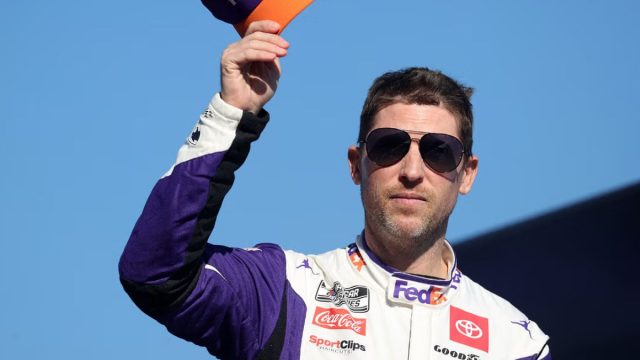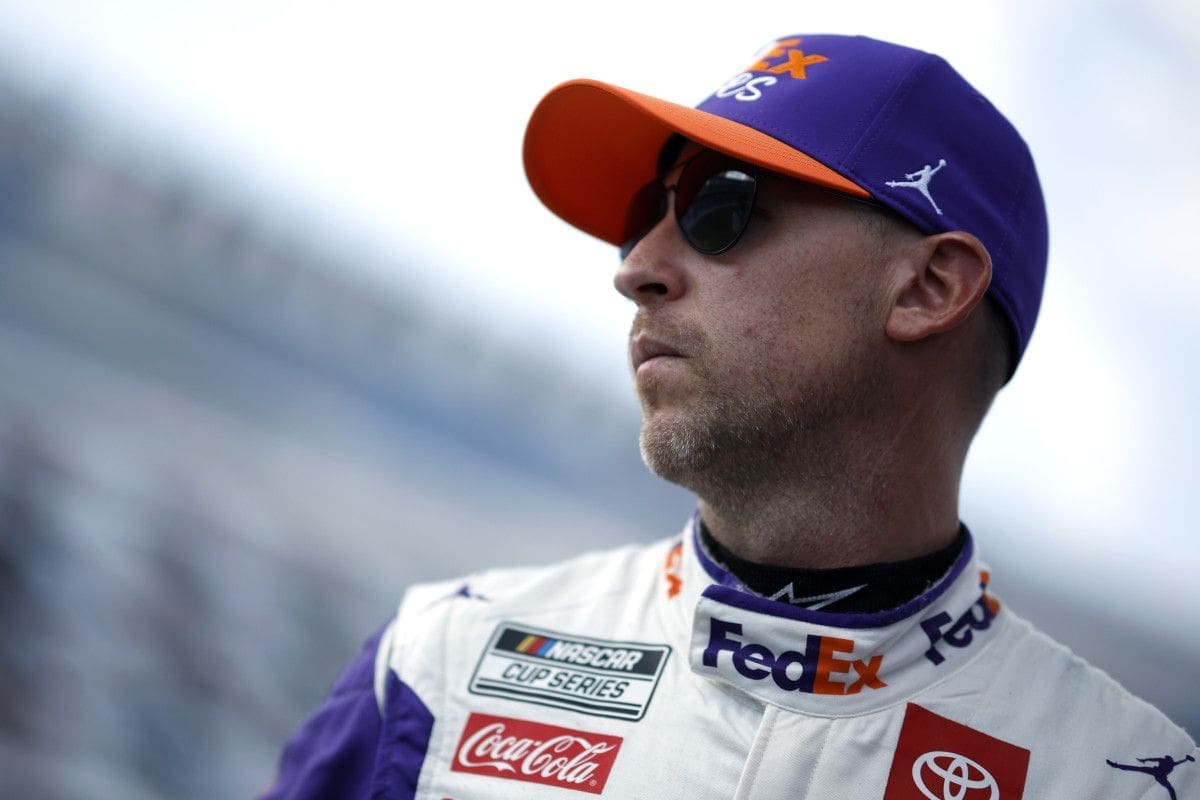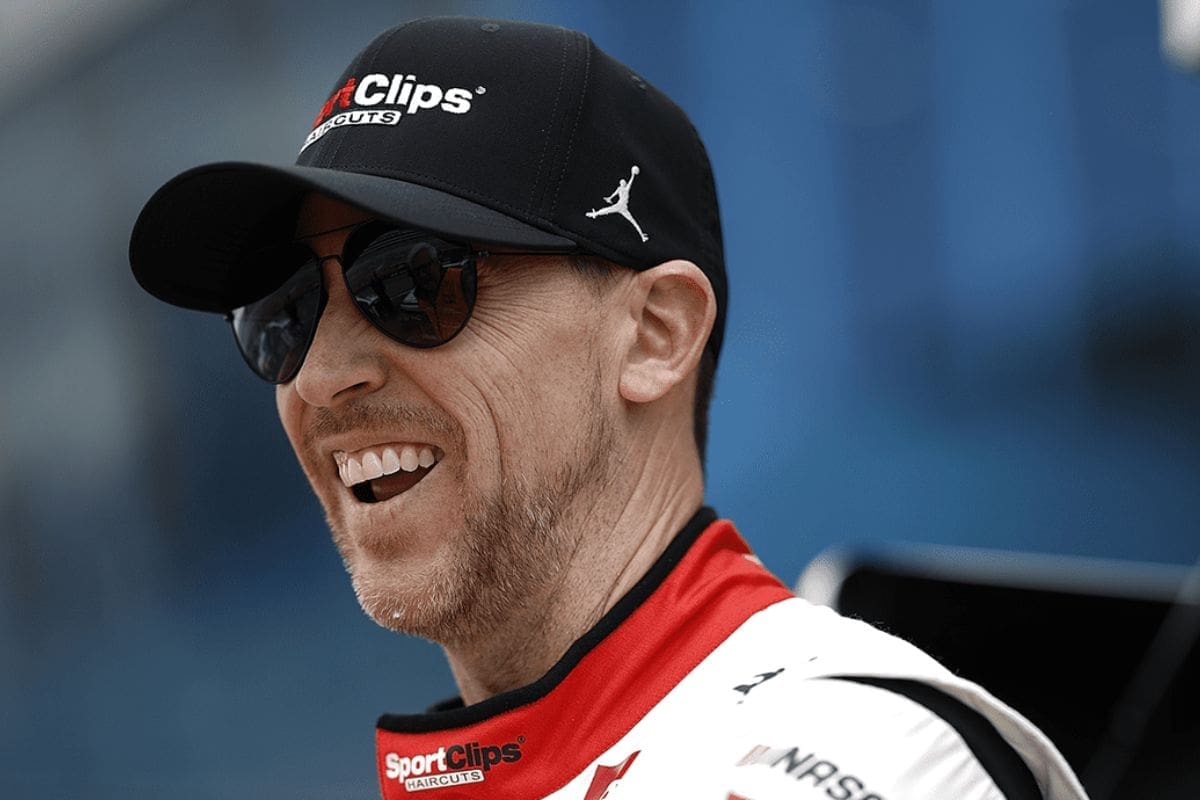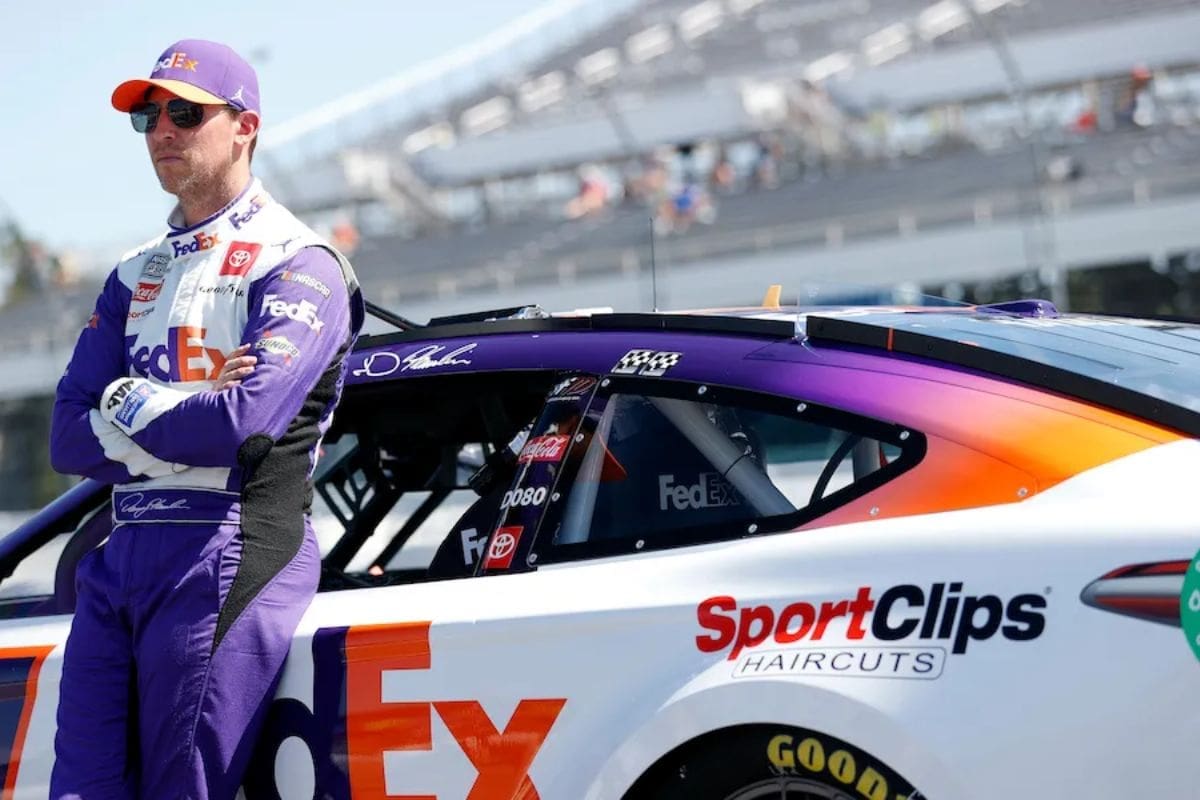Denny Hamlin Slams NASCAR Over Charlotte Decision: Denny Hamlin‘s outspoken rebuttal to NASCAR’s decision to halt the 2024 Coca-Cola 600 at Charlotte Motor Speedway highlights a critical tension between driver perspectives and organizational caution. Hamlin, supported by his crew chief, argued that track conditions were on the verge of being suitable for racing, suggesting that the stoppage was premature. This incident sheds light on the intricate balance NASCAR must strike between ensuring safety and maintaining the competitive spirit that drives motorsports. How does NASCAR’s approach compare to other racing organizations like Formula One, and what implications does this have for future decisions in similar situations?
Key Highlights
- Denny Hamlin criticized NASCAR for halting the Coca-Cola 600, believing the track was almost ready for racing.
- Hamlin’s crew chief estimated the track could have been race-ready within 30 minutes.
- Michael Jordan observed lingering wetness, differing from Hamlin’s assessment of track conditions.
- Hamlin emphasized the importance of pushing boundaries in track readiness decisions.
- NASCAR’s decision aimed to balance competitive integrity with the safety and welfare of all stakeholders.
The Anticipation and Disappointment of the 2024 Coca-Cola 600
The 2024 Coca-Cola 600, hailed as NASCAR’s longest and one of its most challenging races, was highly anticipated by fans and drivers, especially with Kyle Larson’s daring 1100-mile Double attempt adding excitement. The prospect of Larson competing in both the Indianapolis 500 and the Coca-Cola 600 on the same day promised to enhance the spectacle, drawing attention from a wide range of motorsport enthusiasts. The Double is a rare feat demanding exceptional stamina, skill, and strategic expertise, making Larson’s endeavor a focal point of pre-race discussions.
Anticipation was evident not just in the grandstands but also in the community, where teams and drivers carefully prepared for the grueling 600-mile contest at Charlotte Motor Speedway. The Coca-Cola 600, known for its challenging nature, tests the limits of man and machine, requiring strategic pit stops, tire management, and impeccable driving precision over its extended duration. This year, the race was set against the backdrop of unpredictable weather forecasts, which added complexity and uncertainty to the event.
After a four-hour delay in Indianapolis due to thunderstorms, the bad weather followed Larson to Charlotte. When he got there, NASCAR stopped the race because of lightning. This delay ended the race. Some reasons were given for the delay, but Denny Hamlin recently disagreed with them.
The interruption not only ruined the well-planned strategies of drivers but also dampened the spirits of the passionate fans who had gathered to witness an epic motorsports marathon. In particular, Larson’s ambitious Double attempt was notably compromised, highlighting the inherent unpredictability and challenges posed by external elements in motorsports.
Denny Hamlin Challenges NASCAR’s Weather Decision
Kyle Larson had a tough day on Sunday. He finished 18th at the Indy 500 because of a speeding penalty and didn’t get to race at the Coca-Cola 600. The Cup race was stopped after 249 out of 400 laps. NASCAR used its Air Titans, jets, and blowers to dry the 1.5-mile track, hoping to restart the race later that night. However, they canceled the race due to high humidity, saying no laps could be run before 1 am.
In the aftermath of the weather-induced interruptions that disrupted the 2024 Coca-Cola 600, Denny Hamlin openly criticized NASCAR’s decision to halt the race, arguing that the track conditions were nearing suitability for competition. On his podcast, ‘Actions Detrimental,’ Hamlin conveyed insights provided by his crew chief, Chris Gabehart, who estimated that the track would have been race-ready within 30 minutes. This assessment contrasted with NASCAR’s precautionary stance and Michael Jordan’s observations of lingering wetness on the track.
“He (Chris) said that we need to stay close because the track is drying quicker than we thought…We thought we were within 30 minutes of going back.” – (hamlin)
Hamlin’s argument centered on the premise that NASCAR prematurely called off the race, potentially robbing teams and fans of a competitive outcome. He asserted that the drying efforts were progressing adequately, and a brief delay could have allowed the event to resume safely. Hamlin emphasized the importance of pushing the boundaries of track readiness, drawing from his extensive experience and the expert judgment of Gabehart.
“But man, you had so many people there, you had a sold-out crowd. I thought by what I saw that by 12 ‘o’clock, we would be racing…At 12:15, the track was dry.” – (hamlin)
However, Hamlin’s perspective was not without its criticizers. Michael Jordan, co-owner of 23XI Racing, shared a differing viewpoint, noting that he observed patches of wetness that could have posed safety risks to drivers. This variance in opinions highlights the inherent challenges NASCAR faces in balancing safety with the desire to maintain the integrity of race schedules.
“Of course, it was wet, but I think he’s giving you a very broad statement…It was damp in some areas…There’s wet tracks, damp tracks, and dry tracks. It was on the verge of being dry really quickly.” – (hamlin)
NASCAR’s Decision and Considerations
Kyle Larson might have been upset about not starting his engines at the Coca-Cola 600, but other drivers and fans thought a late-night race was possible. However, it wasn’t just the drivers and race teams working hard. Many workers were doing 24-hour shifts, arriving early in the morning to get the track ready. Local police officers also had late-night tasks, managing traffic.
Amid the debate over the race’s suspension, NASCAR Senior VP Elton Sawyer emphasized the importance of considering the broader impact on competitors, fans, and event staff. While Denny Hamlin was vocal about his belief that the race could resume despite adverse weather conditions, Sawyer provided a more all-encompassing perspective on the decision-making process.
“We were up for it; we attempted to get the track dry, it just wasn’t going to come in…As all of that started unfolding, looking at the timelines and the amount of racing we needed to complete the race, 151 laps, we were looking at well past 2 a.m., which just didn’t feel right for our competitors or our fans alike, and all the workers that had been there all day.” – (sawyer)
Sawyer revealed that NASCAR was technically prepared to continue the race but had to weigh the practical implications. He highlighted the potential for the race to extend into the early hours of the morning, possibly past 2 a.m., which would have significant ramifications. Competitors, already under immense physical and mental strain, would face additional fatigue.
Additionally, fans, many of whom travel considerable distances to attend events, would be affected by the prolonged duration, potentially leading to safety concerns during their return travels.
Furthermore, Sawyer emphasized the impact on event staff, whose roles are critical yet often overlooked. These employees, ranging from security personnel to track maintenance crews, would also endure extended hours, raising questions about their well-being and job performance under such conditions.
Comparing NASCAR and Formula One Practices
Highlighting NASCAR’s prudent approach, Formula One often welcomes the challenge of late-night racing, showcasing divergent priorities and operational philosophies between the two motorsport giants. Formula One’s appreciation for night races, evident in iconic events such as the Singapore Grand Prix, emphasizes its commitment to presenting the sport under unique and dramatic conditions. These nighttime spectacles are crafted to capture global audiences, leveraging the appeal of illuminated tracks and the strategic complexities of racing in cooler temperatures.
“They started an F1 race by the way at 1 AM in Vegas, 1 AM Eastern they started. Hell, they ran practice I think at 3:30 in the morning in Vegas…I mean, what does it matter? People were there.” – (hamlin)
NASCAR, on the other hand, demonstrates a more conservative and stakeholder-focused ethos. The decision to cancel the Charlotte race, as emphasized by Denny Hamlin’s criticism, was not simply a matter of logistical convenience but one that took into account the broader implications for track workers, law enforcement, and local communities. This decision highlights NASCAR’s prioritization of operational feasibility and stakeholder welfare over the potential excitement of a late-night spectacle.
The differing approaches also mirror underlying disparities in the sports’ structures and audience expectations. Formula One, with its international presence and focus on glamour, often prioritizes factors that enrich the global appeal and commercial viability of the sport.
In contrast, NASCAR’s roots in American culture and its strong ties with local communities necessitate a more cautious approach, ensuring that decisions are in line with the practicalities of race management and the well-being of all involved.
Balancing Ambition with Practicality
Emphasizing ambition with practicality, NASCAR’s decision to cancel the 2024 Coca-Cola 600 highlights the sport’s dedication to prioritizing the safety and well-being of its stakeholders over the temptation of pushing forward under adverse conditions. The abrupt end to one of NASCAR’s marquee events due to inclement weather may have left fans disappointed and drivers like Denny Hamlin questioning the decision, yet it highlights the intricate balance between ambition and practicality that motorsports must navigate.
NASCAR’s commitment to safety is a fundamental aspect of its operational philosophy. In a sport where high-speed thrills and split-second decisions define each race, the governing body must constantly weigh the potential risks against the excitement that the sport inherently promises. The decision to cancel the race, while controversial, is a manifestation of this principle, recognizing that pushing through dangerous weather could result in catastrophic outcomes.
Denny Hamlin’s critique reflects the broader sentiment of competitors who train rigorously and invest heavily in preparation, only to see their efforts ruined by external factors. However, the broader perspective, grounded in practicality, understands that the integrity of the sport relies not only on the spectacle but also on ensuring that every participant, from drivers to crew members to fans, is safeguarded from preventable harm.
News in Brief: Denny Hamlin Slams NASCAR Over Charlotte Decision
The controversy surrounding NASCAR’s decision to halt the 2024 Coca-Cola 600 highlights the complexities inherent in balancing safety protocols with the desire for competitive integrity. Denny Hamlin’s critique exemplifies the tension between drivers’ perspectives and organizational caution.
This incident brings to light the broader challenge faced by motorsports organizations in making timely, wise decisions. The comparison with Formula One practices further clarifies the different approaches to race management, emphasizing the need for a detailed, context-specific strategy in motorsport governance.
Our Reader’s Queries
Q. Has Denny Hamlin ever won a NASCAR championship?
A. Having surpassed Martin’s 40-win mark, Hamlin now holds the distinction of being the winningest driver in NASCAR Cup Series history without clinching the championship title. Like the legends of the 1990s and 2000s, he has been afforded numerous opportunities to claim the coveted championship, yet success has eluded him thus far.
Q. Has Denny Hamlin ever won on a road course?
A. Hamlin clinched his inaugural road course victory by leading a mere 10 laps out of the 90-lap race, yet it was the critical ones at the finish that truly mattered.
ALSO READ: Denny Hamlin Claims NASCAR Pushing Owners Out Amid Stewart Exit



